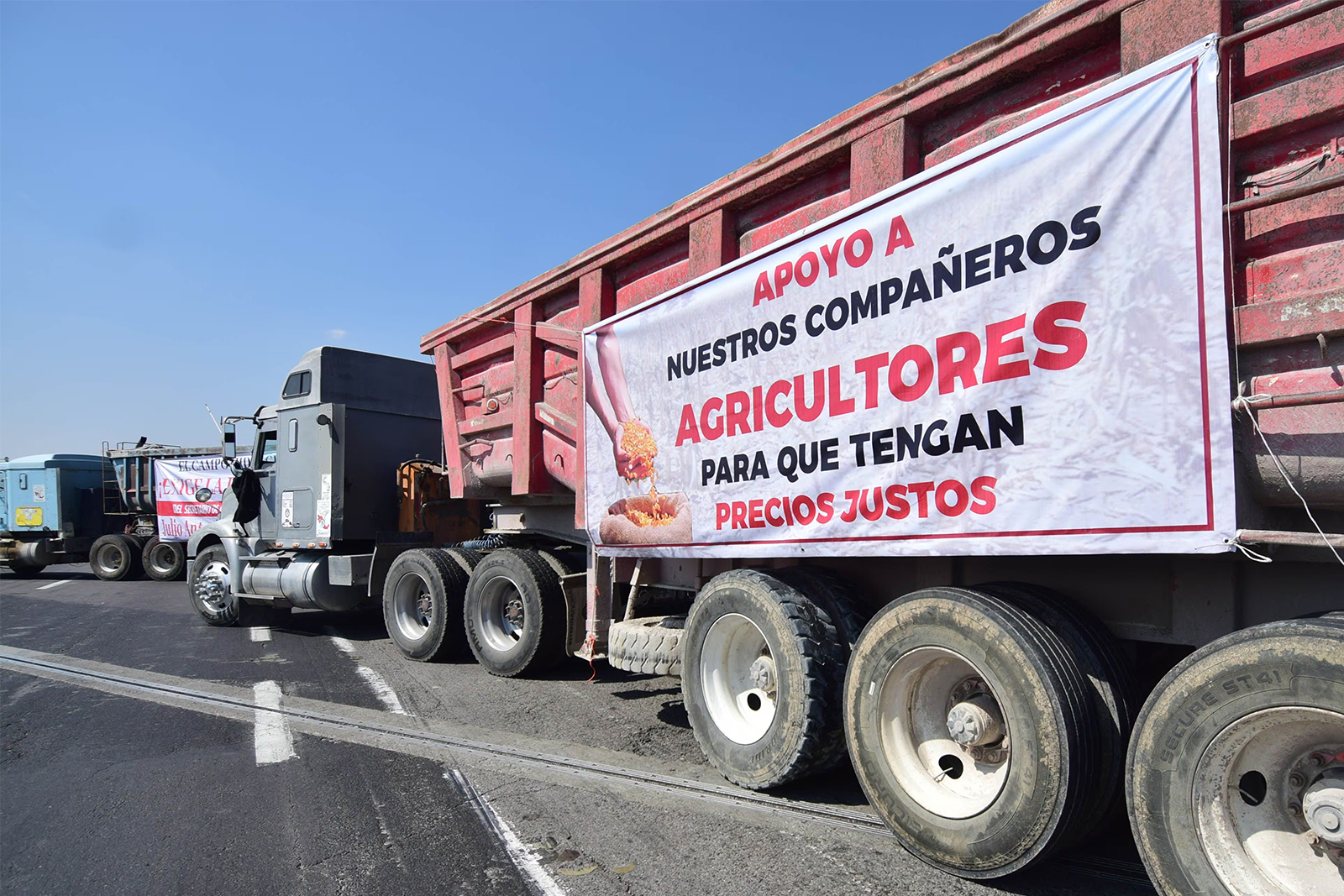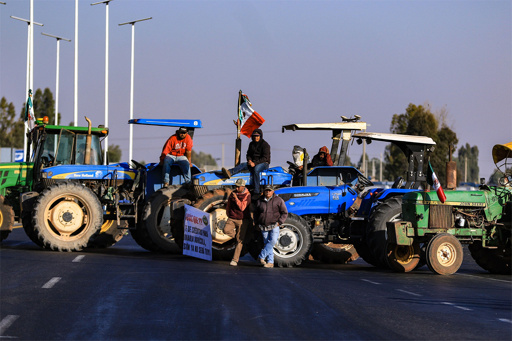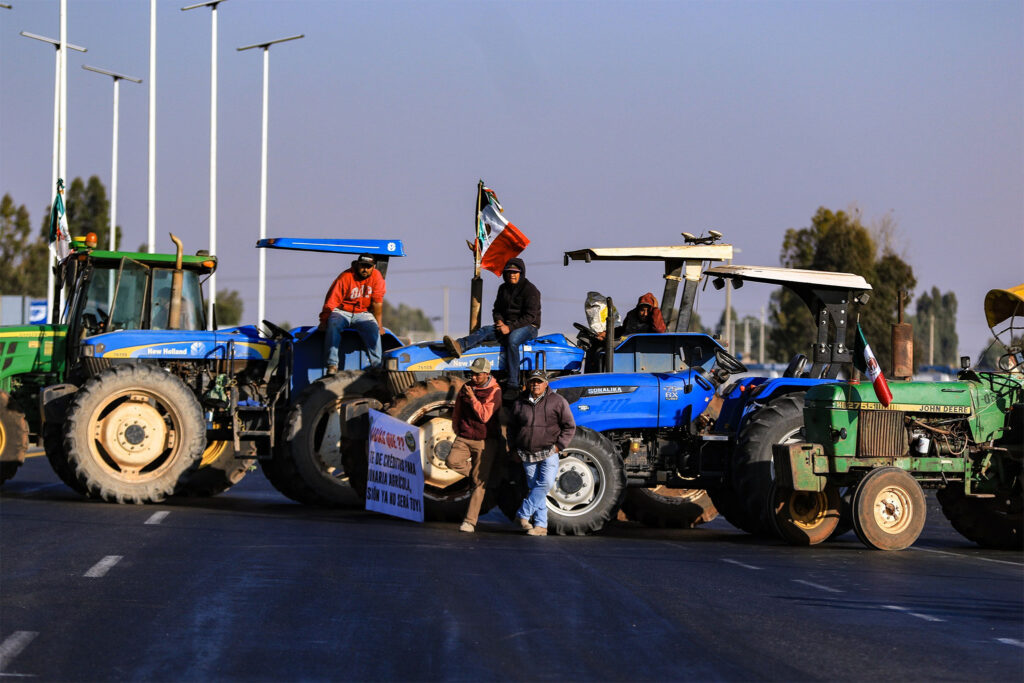This editorial by Luis Hernández Navarro originally appeared in the November 25, 2025 edition of La Jornada, Mexico’s premier left wing daily newspaper. The views expressed in this article are the author’s own and do not necessarily reflect those of Mexico Solidarity Media*, or the Mexico Solidarity Project.*
Editor’s note: Predictably, the recent farmers actions in Mexico originate from ideologically diverse quarters, from the remnants of the old, PRI-dominated campesino organizations to more left-wing organizations, but the primary demands have remained consistent and progressive: to secure food sovereignty, particulary in basic grains, in a country which has experienced massive dumping from the United States for decades, since the origin of the “free trade” agreements. There’s no more stark example of the disaster facing the Mexican field than corn. The dilemma is expertly described in this article by Timothy A. Wise. Mexico, which is almost entirely sovereign in corn production and known as the home of corn, is flooded with white corn from the United States, heavily-subsidized to the tune of over $5 billion USD annually and supported by a variety of programs and supports from governments at all three levels in the United States.
There is no deadline that will not be met.
The threat posed by farmers and a truckers’ organization to block highways and border crossings and occupy customs offices materialized this Monday. They are demanding road safety, fair prices for their crops, and changes to the new water regulations, which they believe threaten their livelihoods.
A rural leader explains his reasons for demonstrating with overwhelming logic.
He says: “It’s better to be elderly than a farmer. A producer with five hectares receives just over 14,000 pesos annually from the Production for Well-being program. A senior citizen receives close to 40,000 pesos annually.”
There is no precedent for a rural protest like the current one. What is unprecedented is a combination of several factors: its national reach, its persistence, the anger of its organizers, their discontent with the new proposed reform to water legislation, and their alliance with a sector of truckers.
Intermittently, since October 14, farmers have blocked roads with their agricultural machinery, given free passage to vehicles at toll booths, disrupted the free movement of goods and people, denounced the large flour oligopolies (Minsa and Maseca), and angrily questioned officials in the sector.

On November 24, the conflict escalated another step.
In recent years, during the current administration, there have been radical and massive protests in Sinaloa, Chihuahua, and Tamaulipas, but these have been localized. In 2020, residents of Chihuahua occupied the La Boquilla dam. In June 2023, residents of Sinaloa took over the airport, forcing the cancellation of flights. Last July, sorghum farmers from Tamaulipas blocked the Reynosa-Pharr International Bridge.
Now, their actions have national coordination and reach.
Their discontent persists. Every time the government announces that the problem is solved, the farmers respond with new protests. Despite some local negotiations, such as the one held with the corn farmers of the Bajío region, anger continues to surface everywhere.
Mexico’s new rural movement insists a different agricultural policy is needed: its agenda includes development banking, guaranteed prices for staple grains and oilseeds, recognition of the concept of national agriculture, and the removal of staple grains from the USMCA so that prices can be determined by the domestic market.
With shouts and table-banging, just last November 20th, outraged farmers from Campeche protested to the Undersecretary of Agriculture, Leonel Cota, about the government’s failure to guarantee a market for their 700,000-ton white corn harvest. They denounced the government for not engaging in negotiations with companies like Maseca and Minsa to secure a purchase price for their corn.
Among the many problems that will arise in the immediate future (with this grain alone), one stands out: the planting of white corn in Sinaloa, corresponding to the fall-winter season, is about to begin. Farmers complain that it’s not profitable. Flour millers pay them just over four pesos per kilo for the corn, and they sell tortillas for 27 pesos. There is no government support, nor any certainty that the price of the grain will cover production costs. To make matters worse, insecurity is on the rise. This year, production fell by almost 50 percent compared to 2022. Ejido members are threatening not to plant this season.
But beyond the immediate issue of prices, the new rural movement insists that a different agricultural policy is needed. Its agenda includes development banking, guaranteed prices for staple grains and oilseeds, support for hedging, recognition of the concept of national agriculture, and the removal of staple grains from the USMCA so that prices can be determined by the domestic market.
As if the sector’s problems weren’t enough, the situation became even more complicated with initiatives for a new General Water Law and to reform the National Water Law, justified as necessary to end the black market for blue gold, bring order to the sector, and provide legal certainty to producers.

But, despite the good intentions, two separate laws were absurdly established to regulate the same issue, which has an indivisible material unity: water. Furthermore, the human right to this vital resource was relegated to mere declarations.
The proposal sparked immediate outrage and condemnation from both the left and right, environmental organizations, and farmers. Medium and large-scale farmers with water concessions view the initiative as discriminatory, negatively impacting the value of their land. The National Indigenous Congress predicted that it would further concentrate water resources in the hands of a few.
Although proponents of the reforms do not agree that this is the case, farmers are concerned about the replacement of concessions with “temporary authorizations” granted by a National Water Authority, with a short term, discretionary and revocable at any time.
They maintain that they do not generate acquired rights nor can they be transmitted (inherited to their children).
The initiative establishes stricter requirements for the management of this vital resource by ejidos (communal landholdings) and agrarian communities. Critics point out that they will be required to report to the water authority, annually and within established deadlines, the gross volume extracted from surface and groundwater sources for irrigation, the amount of water used, the cultivated area, the crops irrigated, and the harvested crops.
As Monday’s protests demonstrate, farmers are at a breaking point. Caught between the USMCA trade agreement and a wall of policies that ignore them, they are fighting for their survival. Their anger will not subside anytime soon.
On the International Day for the Elimination of Violence against Women
November 25, 2025November 25, 2025
It is the state’s responsibility to implement the actions required to build a country without violence, where respect, constructive coexistence, & recognition of the value of women and their contribution to the social, economic, & political life of Mexico prevail.
Rural Rage
November 25, 2025
As Monday’s protests demonstrate, Mexican farmers are at a breaking point. Caught between the USMCA trade agreement and a wall of policies that ignore them, they are fighting for their survival. Their anger will not subside anytime soon.
Mexican Government Commits to Eradicating Violence Against Women
November 25, 2025November 25, 2025
The agreement establishes 10 commitments, such as ensuring that no complaint is dismissed by prosecutors or courts of justice.
The post Rural Rage appeared first on Mexico Solidarity Media.
From Mexico Solidarity Media via this RSS feed





